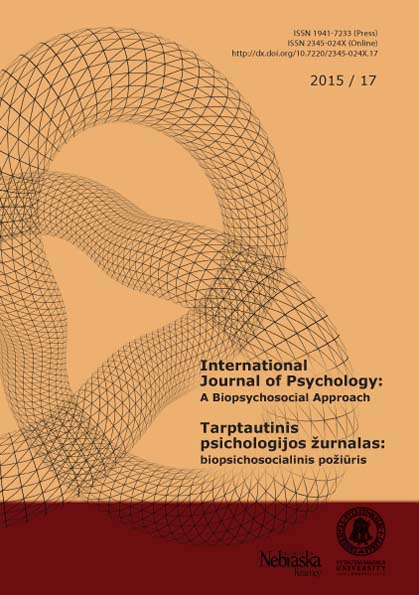MIRTIES NERIMO IR EMPATIJOS SĄSAJOS TARP MEDICINOS STUDENTŲ: PILOTINIS TYRIMAS
RELATIONSHIPS BETWEEN DEATH ANXIETY AND EMPATHY AMONG MEDICAL STUDENTS (PILOT STUDY
Author(s): Žydrūnė Kaklauskaitė, Justina VonžodienėSubject(s): Psychology
Published by: Vytauto Didžiojo Universitetas
Keywords: Death of others anxiety; Personal distress; Empathetic concern; Emotional empathy
Summary/Abstract: Background. Death anxiety is defined as emotionally negative reactions provoked by thoughts about death and dying of self, and death and dying of others (Lester, 1990). Empathy refers to the reactions of one individual to the observed experiences of another (Davis, 1983). As determined by Kurz and Hayes (2006) in their study, death anxiety affects the student’s successful transition from theoretical knowledge to their practical application, while medical empathy has a significant impact on patient satisfaction with treatment (Regehr, Goldberg, Hughes, 2002; Wimmer, Stuber, 2010; Ward, Cody, Schaal, Hojat, 2012) and on adherence to the treatment plan (Wimmer, Stuber, 2010), better disease outcomes and the physician-patient relationship (Caruso, Bernstein, 2014; van Ryn et al., 2014). Research studies on death anxiety among medical students are scarce. The number of articles on death anxiety’s link to empathy in foreign literature is limited, and this relationship has not been fully investigated in the studies conducted. Unfortunately, there are no studies in the Lithuanian language on the relationship between death anxiety and empathy seen as the main subject matter of the research. This suggests that the given field of science has not been fully explored. The aim of this study was to investigate the relationships between death anxiety and empathy among the students of Lithuanian University of Health Sciences. Methods. The study involved 47 third-year medical students of the Faculty of Medicine of Lithuanian University of Health Sciences. A questionnaire designed for the study consisted of demographic questions, empathetic concern and personal distress subscales in the scale of Interpersonal Reactivity Index (IRI) (Davis, 1980), and the death of others and the dying of others subscales in the revised Collet – Lester Fear of Death and Dying Scale (Lester, 1990). Results & Findings. It has been found that female medical students tend to have more death of others and dying of others anxiety and display higher levels of overall empathy and personal distress than male medical students. It was also found that medical students showing greater empathetic concern have a stronger sense of death of others and dying of others anxiety than students reporting lower levels of empathetic concern. Problema. Mirties nerimas apibrėžiamas kaip emociškai neigiamos reakcijos, atsirandančios asmeniui galvojant apie savo ar kitų mirtį ir savo ar kitų mirties procesą (Lester, 1990). Empatija apibrėžiama kaip vieno asmens individualios reakcijos, sukeltos stebimų ir (arba) matomų žmonių patirties (Davis, 1983). Kurzo ir Hayeso (2006) tyrimu buvo nustatyta, kad nuo mirties nerimo priklauso, ar studentui pavyks sėkmingai teorines žinias pritaikyti praktiškai, o nuo mediko empatiškumo labai priklauso, ar pacientas bus patenkintas gydymu (Regehr, Goldberg, Hughes, 2002; Wimmers, Stuber, 2010; Ward, Cody, Schaal, Hojat, 2012), laikysis gydymo plano (Wimmers, Stuber, 2010), ar pavyks pasiekti geresnių gydymo rezultatų ir užmegzti geresnius ryšius su pacientu (Caruso, Bernstein, 2014; Ryn et al., 2014). Mirties nerimo tarp medicinos studentų tyrimų nėra daug. Užsienio literatūroje straipsnių, nagrinėjančių mirties nerimo ir empatijos ryšį, kiekis ribotas, o rastuose darbuose šis ryšys nėra iki galo ištirtas. Lietuvių kalba publikuotų straipsnių, kuriuose pagrindinis dėmesys būtų skiriamas mirties nerimo ir empatijos ryšiui, rasti nepavyko. Tai leidžia manyti, kad ši sritis nėra iki galo ištirta. Šio darbo tikslas – ištirti Lietuvos sveikatos mokslų universiteto medicinos studentų mirties nerimo ir empatijos sąsajas. Metodai. Tyrime dalyvavo 47 Lietuvos sveikatos mokslų universiteto Medicinos fakulteto trečio kurso medicinos studentai. Tyrimui naudotas klausimynas, kurį sudarė demografiniai klausimai, empatiško rūpesčio ir asmeninio distreso subskalės, esančios Tarpasmeninio reaktyvumo indekso skalėje (angl. Interpersonal Reactivity Index, sutr. IRI, Davis, 1980), taip pat kitų mirties ir mirimo subskalės, esančios pataisytoje Collet-Lester mirties ir mirimo baimės skalėje (angl. The Revised Collet-Lester Fear of Death And Dying Scale, Lester, 1990). Rezultatai ir išvados. Tyrimo metu nustatyta, kad medicinos studentės dažniau jaučia nerimą dėl kitų mirties ir mirimo, pasižymi didesniu bendrosios empatijos ir asmeninio distreso lygiu nei studentai vyrai. Taip pat nustatyta, kad medicinos studentai, kuriems būdingas didesnis empatiškas rūpestis, jaučia didesnį nerimą dėl kitų mirties ir mirimo nei mažesniu empatišku rūpesčiu pasižymintys studentai.
Journal: Tarptautinis psichologijos žurnalas: biopsichosocialinis požiūris
- Issue Year: 2015
- Issue No: 17
- Page Range: 117-136
- Page Count: 20
- Language: English

